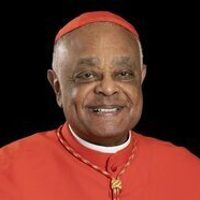(This is the text of Washington Archbishop Wilton D. Gregory's homily at the Aug. 28, 2020 Mass of Peace and Justice held at the Cathedral of St. Matthew the Apostle to mark the 57th anniversary of the March on Washington.)
Washington, D.C., has held many large-scale events before. Some were associated with political occasions. Some celebrated triumphant military accomplishments. Some were held in opposition to a certain issue even as others were held in support of that very same issue.
Washington is a city accustomed to parades, marches, and demonstrations. What took place in Washington, D.C., 57 years ago today does not fit conveniently in any of those prior categories. It was a moral and religious event that confronted our nation in ways that defied such simple categorization. This very church itself was a proud part of that day as then-Archbishop Patrick O’Boyle invited people to pray with him here in this very space before the day’s activities began. Archbishop O’Boyle had already established himself as a well-known champion of racial justice.
From the very beginning, that historic March on Washington D.C. 57 years ago was a deeply faith-inspired event. The vast majority of the oratory of the day highlighted social and civil concerns, but always with an undeniable touch of religious faith. People from a wide variety of religious traditions were united in a prayerful moment for our nation. The existing social order was clearly challenged by people of faith. That is exactly what we need today.
Many attending that March on Washington in 1963 may not have been active members of any religious congregation. Some may not even have claimed to have been religious believers at all. Yet the spirit that they shared on that remarkable day was unmistakably sacred. With that spirit, they were ready to change the world. It gave them a clearer vision of what our nation was called to be – what we must become – as it was described so eloquently in the words of Dr. King.
Matthew’s Beatitudes are a spiritual compendium for transforming society and most importantly for converting the human heart. They fit this commemorative observance perfectly as they highlight the virtues and the spiritual vision that are necessary for society’s renewal. The merciful, the peacemakers, those who hunger and thirst for righteousness, all point to a society of harmony and justice which were the desired end of that march 57 years ago. Dr. King spoke movingly about what our nation was destined to and must become. He no doubt had reflected often on these Beatitudes.
Because of the restrictions of Covid -19, this cathedral gathering is smaller in number than it certainly would have been under different circumstances. Yet the intensity of our prayer is not diminished in the least. Some of those in the assembly this afternoon may well have been present for the March on Washington. They have lived the saga of that momentous event and their presence with us today is an incarnate connection to that pivotal episode in American history.
The March on Washington in 1963 was less about achieving something than about becoming something – a single family of justice, unity and harmony.
Surely those goals are noble and more than desirable even today – perhaps especially today. Death has silenced most of the great voices of August 28, 1963: Dr. King, John Lewis, A. Philip Randolph, Mahalia Jackson, and Marian Anderson to name only a few. Nevertheless, the intensity, the determination, and the energy of their spoken and sung words echo still today.
We are at a pivotal juncture in our country’s struggle for racial justice and national harmony. Ours is the task and the privilege of advancing the goals that were so eloquently expressed 57 years ago by such distinguished voices on that day. Men and women, young and old, people of every racial and ethnic background are needed in this effort. Believers and non-believers, sports stars and corporate giants, small town residents and urban dwellers must all engage in the work of reconciliation and unity-building so that our common future will be better and more secure than the past.
We must take heart and not be dissuaded or intimidated by the voices that seek division and hatred because we shall overcome!













